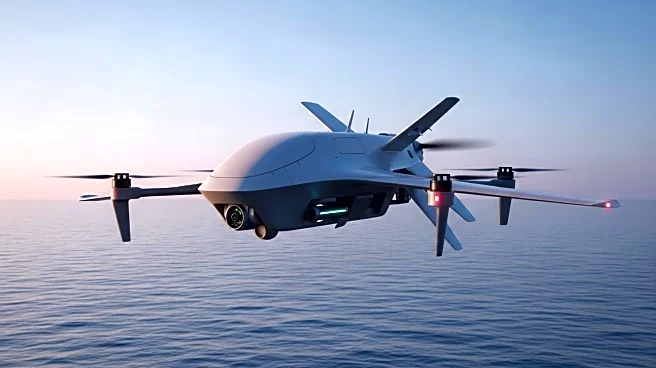What's Happening?
Thales has announced a collaboration with British robotics company Autonomous Devices to develop an electronic warfare uncrewed air system (EW-UAS). This system is intended to serve as a ship-defense offboard decoy, with its primary focus on electronic attack roles to protect naval ships. The EW-UAS, weighing less than 50 kg, is designed for rapid deployment and maneuverability to safeguard vessels. The U.S. Office of Naval Research has issued a request for information for a ship-based long-endurance decoy, highlighting the U.S. Navy's concern over threats from high-speed, maneuvering anti-ship missiles. Thales has responded to this request, aiming to replace the current BAE Systems Nulka offboard decoy.
Why It's Important?
The development of the EW-UAS by Thales and Autonomous Devices represents a significant advancement in naval defense technology. As naval threats evolve, particularly with the rise of high-speed anti-ship missiles, the need for effective countermeasures becomes critical. The partnership aims to address these challenges by providing a more agile and responsive defense system. This initiative could enhance the U.S. Navy's capabilities in electronic warfare, potentially leading to increased security for naval operations and assets. The collaboration also underscores the importance of international partnerships in advancing defense technologies.
What's Next?
Initial testing of the EW-UAS is scheduled to continue throughout the year, with Thales focusing on refining the system's deployment and maneuverability capabilities. The U.S. Navy's interest in long-endurance decoys suggests potential future contracts or collaborations, depending on the success of the testing phase. Stakeholders in the defense industry will likely monitor the progress closely, as successful implementation could lead to broader adoption of similar technologies across other military branches.
Beyond the Headlines
The partnership between Thales and Autonomous Devices highlights the growing trend of integrating robotics and artificial intelligence into defense systems. This development could pave the way for more autonomous solutions in military applications, raising questions about the ethical implications of using AI in warfare. Additionally, the focus on electronic warfare reflects a shift in defense strategies, emphasizing the importance of cyber capabilities alongside traditional military assets.









